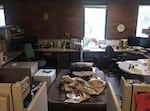
A cot, squeezed in among office cubicles at a child abuse hotline office, where a teen slept back in June 2016.
Courtesy of Shamus Cooke
Kelly Paluso has been a child welfare worker with the Oregon Department of Health for 10 years.
OPB’s Kristian Foden-Vencil asked her what it’s like trying to find a home for a child when he or she is sitting right next to her in the Portland office.
“It’s close to impossible,’ Paluso said.
The biggest problem, she said, is trying to protect the child emotionally. That is, not letting him or her know you’re calling one foster home after another and being turned down, often because the are kids have behavioral issues and are seen as especially challenging.
And Paulso said different aged children present different problems.
Related: With Foster Care System 'Crisis,' Oregon Puts Kids In Hotel Rooms
“Sometimes we’ll have babies that will come in, and you know, luckily there are a lot of people who want to hold babies. But if you have a super fussy baby it makes it hard for everybody to work. Because there’s babies crying or toddlers crying. Or they’re trying to run away and do things that really aren’t safe,” she said.
“I mean we have spaces downstairs that are set up for toys and visits and things like that but the upstairs part, where the workers need to be to do their work isn’t ideal for kids and we definitely have to be watching them and on guard with where they’re going and what they’re doing.”
Rosanne Scott is another a child welfare specialist. She’s worked for the Oregon Health Department for 15 years. She said hoteling kids for days and sometimes weeks, means they’re handed from one case worker to another and another. “It is definitely really hard for the kids,” she said.
“They are sad because they’re not in a familiar place. They feel like they don’t have anybody stable who cares about them. And it’s really tough when they're in our office just waiting and waiting … we’re all busy and trying to attend to them, but doing our own work. And it’s really heart breaking when a child tells you they feel like they don’t belong anywhere and nobody wants them.”
Reginald Richardson, the interim director of the Child Welfare Service, which handles foster care, said state officials don’t want to be hoteling children. But over the last couple of years, the agency has lost more than 500 foster beds, making it very difficult to quickly find accommodation.
Speaking on OPB’s Think Out Loud recently, he said the problems children are dealing with are also worse than they used to be in the past.
“Many of the kids that we’re talking about … are kids who in five or ten years ago would be in psychiatric hospitals.”
Many foster families simply don’t feel competent to look after a child with significant needs.
In that ‘Think Out Loud’ interview, Richardson also denied some of problems state social workers say children in the foster care system face, “They’re not spending the night in DHS offices. They would go to a hotel in that situation.”
A few days later, his press office said Richardson misspoke and that children are indeed spending the night in DHS offices.
Related: Oregon's Foster Care Rate Above National Average
Back with social worker Rosanne Scott, she said the stress that hoteling puts on some kids can cause problem. She gives the example of one 10-year-old, who entered Oregon’s overwhelmed foster care system after release from a psychiatric hospital. He had a tantrum, ripped a TV off the hotel wall and shattered a large mirror.
“Broken glass was involved, there was some blood, there were some objects thrown. Police needed to be called. The child needed to be escorted to the hospital and staff were threatened and head butted and there was physical violence happening,” she said.
Oregon’s foster care system isn’t tracking how much putting kids and case workers up in hotels is costing. But renting two adjoining rooms and staffing them with two people, plus food and incidentals amounts to many hundreds of dollars a night.
Since OPB broke the story, the state agency has started to count how many children end up in this situation.
So far the average is six a week. About 11,000 kids spend at least one day in some kind of foster care each year in Oregon.
